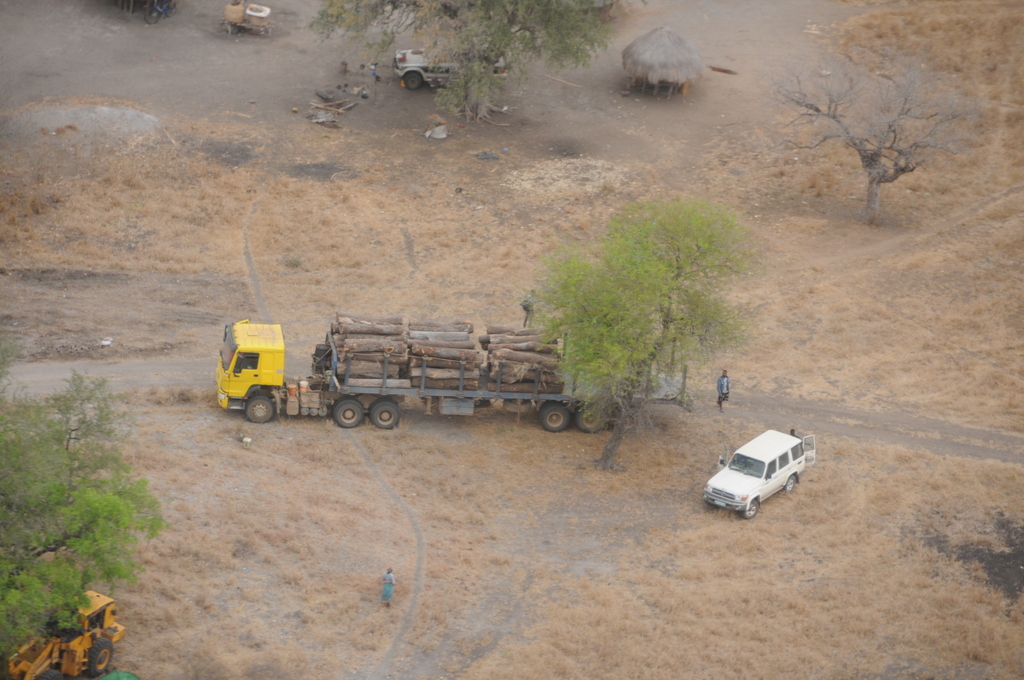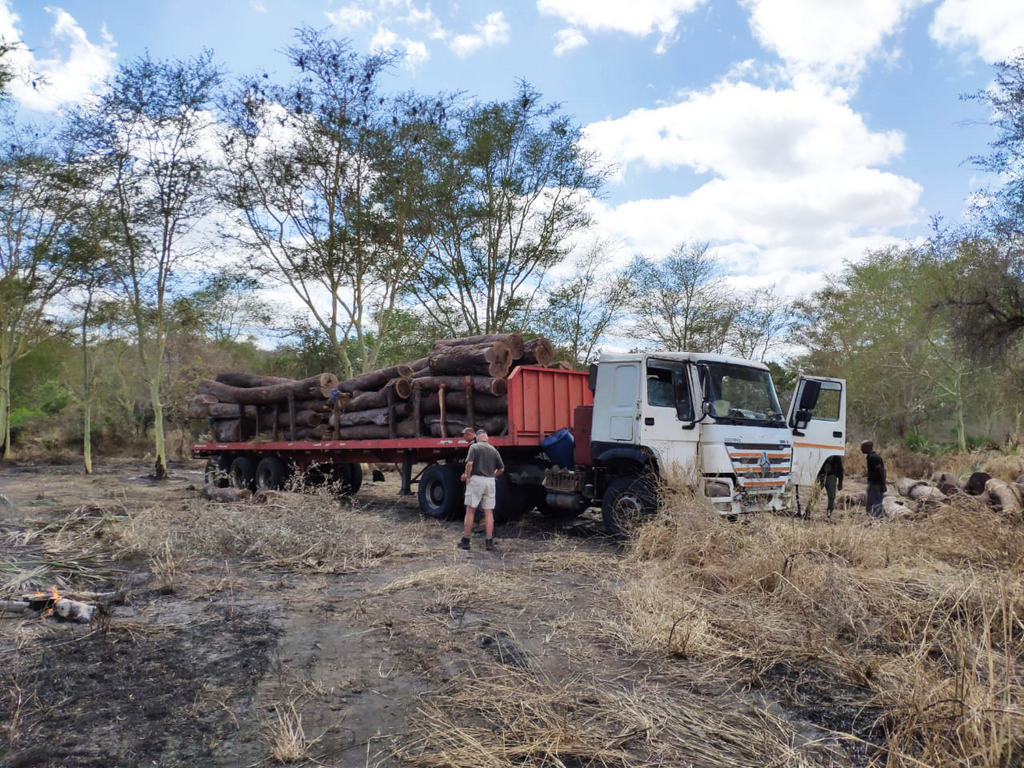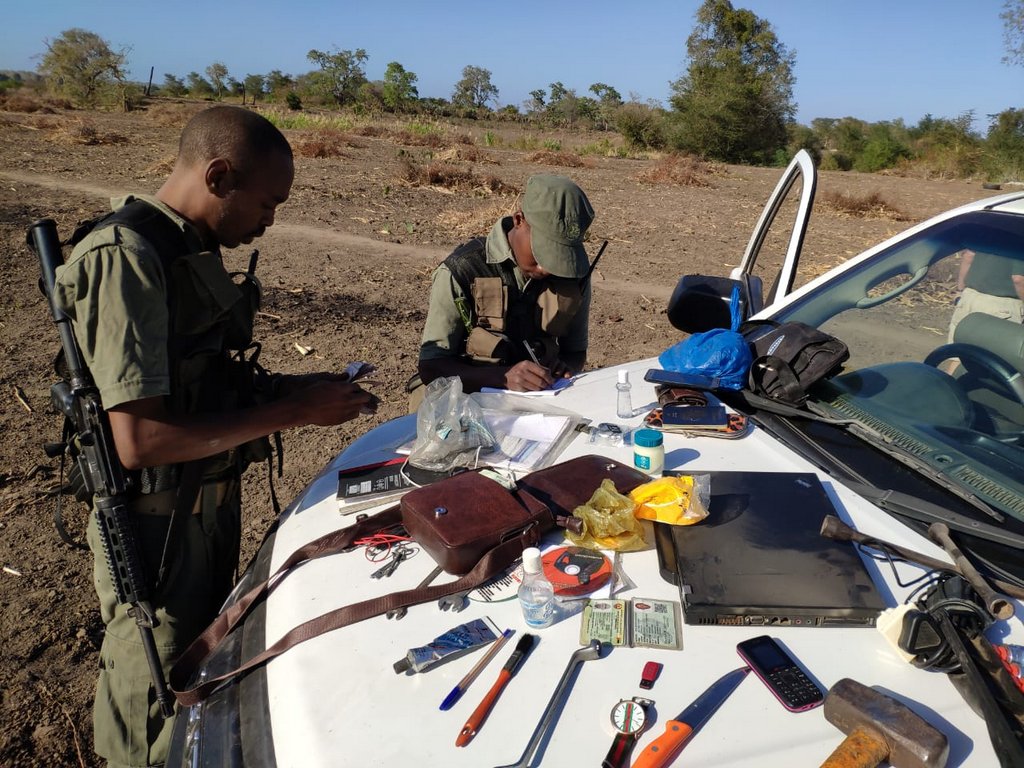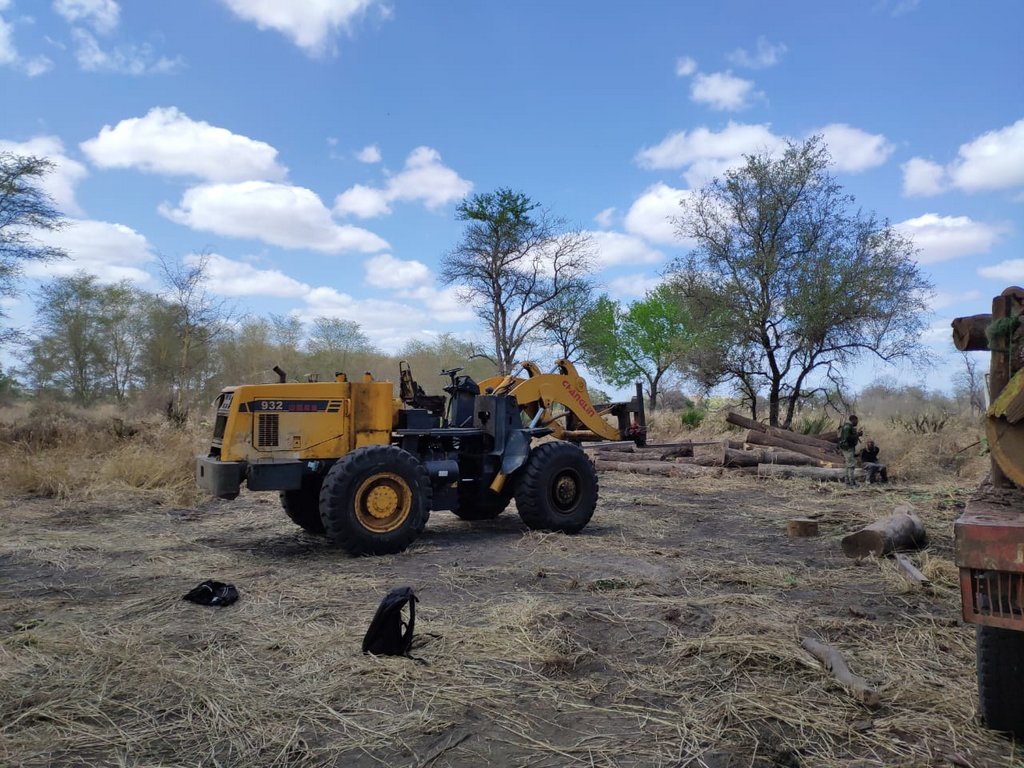by Thomas Lewton on 23 October 2019
- Like other protected areas in Uganda, Bugoma Forest has been threatened by encroachment for decades; now up to a fifth of what remains could be cleared to plant sugar cane.
- Women, generally responsible for growing food, and collecting water and firewood, feel the impacts of forest degradation acutely.
- Despite many obstacles, they are taking up a leading role in defending the environment, particularly against increasing pressure from extractive industries.
KAMPALA, Uganda – “How come these people are coming to Bugoma to destroy our nature? Nature is protecting us,” says Beatrice Rukanyanga as she strides along the forest boundary. Twisting hardwood trees protrude from a tangle of foliage on one side, neat rows of pine and eucalyptus stand on the other.
Rukanyanga cuts into the forest and adeptly maneuvers through the thick undergrowth, selecting leaves from different plants as she goes. “I’m picking medicine for stomach upsets. We’ve also got plants that treat malaria and skin problems,” she explains. For women who live close to the forest, it has always been an important source of food, medicine, and firewood — resources that are dwindling along with the forest.
Bugoma Forest spans 40,000 hectares (98,800 acres) along the northern tip of the Albertine Rift Valley, which divides Uganda and the Democratic Republic of Congo.
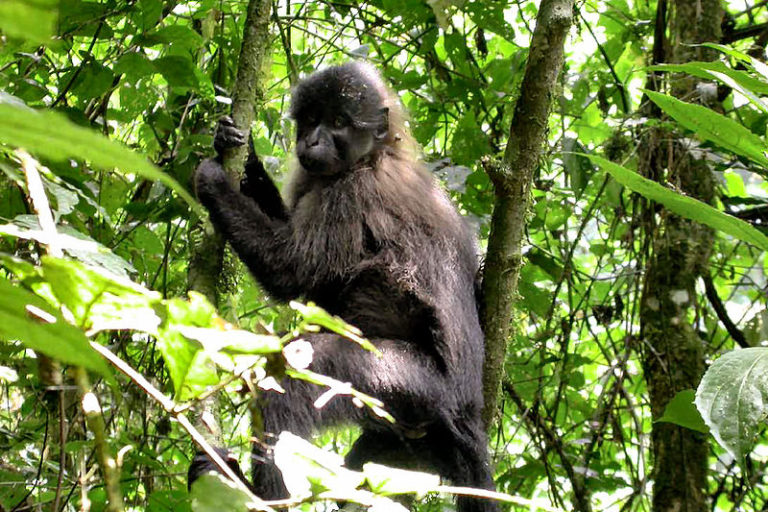
Bugoma is one of the most biodiverse forests in Uganda, home to a wide variety of plants and animals including chimpanzees and Uganda mangabeys (Lophocebus ugandae) like this one (photographed in Kibale National Park). Photo: Duncan Wright/Wikicommons (CC-SA-3.0)
Around 500 chimpanzees have made their home here, alongside a species of mangabey monkey found only in Uganda and hundreds of species of birds, trees and shrubs, making the forest one of the most biodiverse in the country.
For decades, Bugoma Forest has been shrinking. Locals say illegal loggers pay off officials to turn a blind eye to their activities, while tea and timber plantations on the perimeter push the forest’s boundary back piece by piece. Across Uganda, forest cover has declined from 24 percent of the country’s total land area in 1990 to 9 percent in 2015, according to the Ministry of Water and Environment.
Now the forest faces a new and grievous threat. On Bugoma’s northern edge, a yellow bulldozer stands, waiting to begin clearing away forest to make way for a sugarcane plantation. In 2016, the Bunyoro-Kitara Kingdom leased one-fifth of the remaining protected forest to Hoima Sugar Ltd. The lease was challenged, but a High Court ruling in April 2019 found in favor of Hoima Sugar and the Kingdom, once one of the most powerful empires in East and Central Africa, which still enjoys significant autonomy under the state. The National Forest Authority has applied for the court order to be suspended, and is appealing the decision.
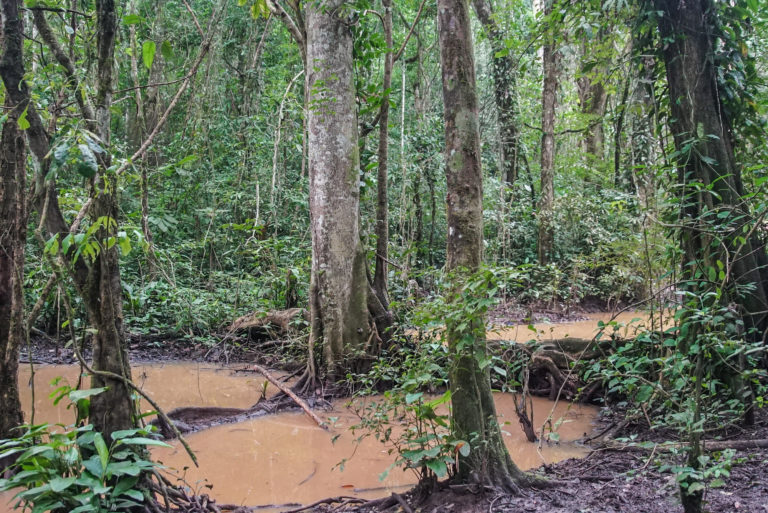
“When we were young, this forest was thick,” says Rukanyanga. “It was giving a lot of rainfall; it was dark wherever you passed.” Photo: Thomas Lewton for Mongabay
The rise of extractives
From oil wells springing up along the Albertine Rift Valley, to forested islands on Lake Victoria razed for oil palm plantations, Uganda’s government is supporting the rapid growth of extractive industries. But ranged against this is the swift growth of an eco-feminist movement that regards protection of the environment as essential to the protection of human rights.
A grassroots network of women is working to raise awareness, share knowledge, and directly resist the destruction of the environment while creating alternative models of development. The movement hopes to strengthen the political and economic power of women in society — and so push back destruction of the natural environment.
“When we were young, this forest was thick,” recalls Rukanyanga, remembering a time before industrial plantations arrived in the region. “It was giving a lot of rainfall; it was dark wherever you passed.” Rukanyanga is the coordinator of the Kwataniza Women Farmers Group, who live near Bugoma Forest and who make and sell charcoal-saving stoves while also educating women about their land rights and the sustainable use of natural resources.
https://youtu.be/XlLowKs1T7o
Beatrice Rukanyana
Rainfall patterns in the region have been disrupted in recent years, which Rukanyanga attributes to widespread deforestation. A 2012 study in Nature found that deforestation in the tropics reduces local rainfall. “Climate change has been real,” she says. “Last year people waited for rains, planted and the seed just died in the soil. There is now food insecurity in most of our homes.”
Traditionally, women are responsible for growing food, and collecting water and firewood — and so they feel the impacts of environmental destruction acutely. Incidents of domestic violence also increase when food is scarce. “When you violate these resources, you are also violating women,” says Sostine Namanya, who coordinates an eco-feminist network in her role for the National Association for Professional Environmentalists (NAPE).
NAPE, along with sister organization the National Association for Women’s Action in Development, has brought together more than 5,000 women from across Uganda to demand both gender and economic justice from the government and its industrial partners. “Women get to know each other, they share experiences and strategize together,” she says, reflecting on how they facilitate exchanges between women’s groups across the country.
They follow in the footsteps of pioneering African eco-feminists such as Wangari Maathai, who in the 1970s founded the Green Belt Movement — responsible for planting more than 50 million trees in Kenya and training tens of thousands of women in practices such as forestry and beekeeping.
In Kampala, Uganda’s Fridays for Future movement, inspired by Greta Thunberg, has young women and girls at its forefront. And in the country’s north, radical feminist traditions are challenging the government and corporate interests. Here Acholi women are known to strip in public to invoke a curse on their enemies; in 2017, this tactic was used by elderly women leaders to oppose 10,000 hectares (24,700 acres) of land being taken to build a sugar-processing facility in Amuru district. The police responded with violence and, despite these protests, the government continued with land evictions.
Speaking out publicly against the government, or the industries they back, is fraught with risk in Uganda. “They can teargas you,” says Rukanyanga, noting that the 2013 Public Order Management Act makes it illegal to organize public meetings without police consent. “So we make a peaceful demonstration. We write placards and we go with letters to the authorities,” she says.
Earlier this year, women living around Bugoma Forest petitioned parliament to oppose the lease to Hoima Sugar, while community forest management groups, whose membership is majority women, patrol the forest boundary and inform the National Forest Authority if they suspect illegal activity.
Namanya acknowledges that Uganda’s political climate limits the activities of the eco-feminist movement, noting that several members have been physically assaulted or unlawfully arrested after speaking publicly about land-grabbing.
But working quietly, from the grassroots, changing attitudes and building communities, can be effective too, Namanya says. “The government, even the president, always says: ‘Ah, you [can] leave the women, they cannot change anything, they are not a threat.’ That is something that we silently take advantage of, to do the organizing and resisting.”
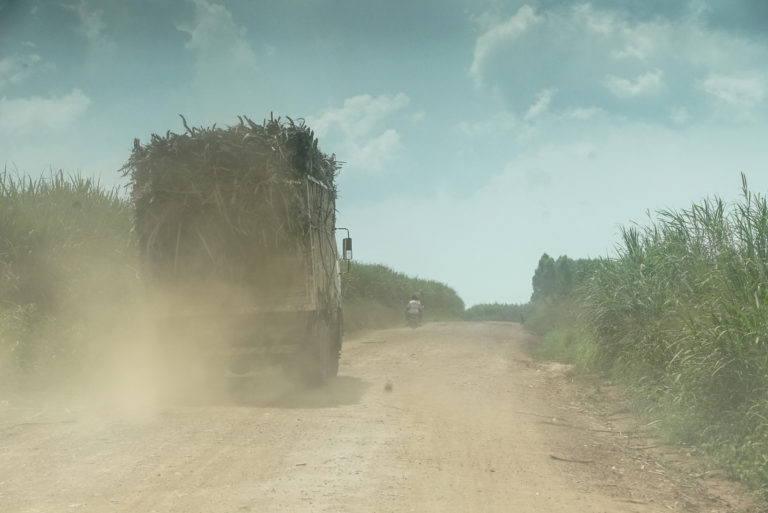
A truck loaded with sugar cane on one of the dirt roads around Bugoma Forest. Photo: Thomas Lewton for Mongabay.
Who benefits?
With tax exemptions and long leases on land offered by the government, Uganda is considered an attractive destination for foreign investors in the mining and plantation industries. In the case of sugarcane, production has quadrupled in the last two decades, and Uganda now exports tens of thousands of tons each year.
Fifty kilometers (30 miles) to the north of Bugoma Forest, a string of oil wells is under construction along the shore of Lake Albert. Since 2006, multi-billion-barrel reserves of crude oil have been discovered in the region, and with the first oil expected to flow in 2022, the Minister of Works and Transport anticipates up to $20 billion of investment in the next three years. And along the northern shore of Lake Victoria since 2003, BIDCO, a transnational soap and oil producer headquartered in Kenya, has cleared thousands of hectares of forest and grassland to plant oil palm.
Government officials say that encouraging these industries is vital for the growth of Uganda’s economy and for local job creation, particularly in impoverished rural areas. Uganda’s GDP per capita is among the lowest in the world.
But an investigation by the eco-watchdog Global Witness in 2017 exposed “endemic corruption and mismanagement” in Uganda’s fledgling petroleum sector, with local economic interests and protection of the environment losing out in favor of international investors and “crooked officials.”
“It is the state, it is big shots in government, it is foreigners who benefit,” Namanya says, pointing to other mineral-rich countries in sub-Saharan Africa that have fallen foul of the resource curse. “How come they are still extremely poor and there is a gross violation of rights? It will not be different for Uganda. We have to find better ways,” she says.
Of concern for the eco-feminist movement is the way in which land is acquired by extractive industries operating in Uganda; illegal evictions following false land claims, and inadequate compensation for land rights are common. On the island of Buvuma, chosen for the next phase of the government’s ambitious oil palm development project, the tensions between economic growth, gender justice and environmental protection are marked.
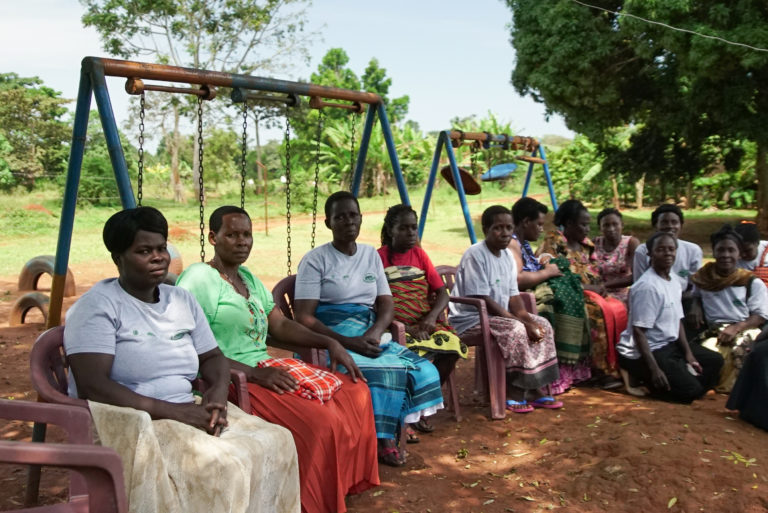
Members of the Ganyana Women’s Group on Buvuma Island: women here have demonstrated a deep understanding of the value of land and the natural services it provides to their families. Photo: Thomas Lewton for Mongabay
Case study: Buvuma Island
“At first, when I used to pass by, most of the islands had forests, but along the landing sites you could see timber waiting for boats to be taken across. Then after a few years it was charcoal,” says Jameson Muberwa, a government agricultural adviser who moved to Buvuma, a tropical island along Lake Victoria’s northern shore, in 1995. “Now you no longer see trees being brought along the landing site.”
Between 1991 and 2014, the population of Buvuma increased fivefold to 90,000 people as cheap land and the hope of work encouraged mass immigration from the mainland. Much of the island’s enduring mosaic of indigenous forest, grass savanna, and wetlands quickly became agricultural land for smallholder farmers. Now dramatic changes are carving up the landscape once again with the imminent development of a 10,000-hectare oil palm plantation on the island, part of the government’s Vegetable Oil Development Project, in partnership with BIDCO.
“The palm oil project is a welcome development for the people,” says Gladys Nalunkuma, Buvuma district’s natural resources officer. She notes how dwindling fish stocks in the lake, crop failures linked to reduced rainfall in recent years, and the decline of the timber and charcoal industries have plunged many residents into poverty. One-third of the land designated for oil palm has been earmarked for around 2,000 local farmers, who will supply palm fruit to BIDCO.
Yet many of Buvuma’s residents are questioning whether they have anything to gain from the project.
“For us local people who didn’t go to school, we would be earning very little,” says Shmirah Nansimbe, chairperson of the Bukigindi Tree Planting Women’s Group. Through dialogues with women on the nearby Ssesse Islands, the location of BIDCO’s original 10,000-hectare plantation, which began operating in 2003, eco-feminists share knowledge about the realities of industrial oil palm.
While the Ssesse Islands project has created around 3,700 jobs, most of these jobs pay less than prevailing wages in the area — and often with poor working conditions. As a result, much of the workforce are migrants to the island, while local communities struggle to continue fishing, farming and living from forest products because of the environmental degradation. With smallholders’ land now occupied by oil palm, food prices on the island have also risen. Despite concerns that these conditions will be replicated on Buvuma, some residents have had little choice over whether they sell their land to the government.
“When BIDCO came in they didn’t teach people about the positives and negatives,” says Mariam Nakatu, who is leading a legal case against the government by 250 evicted households of Buvuma. “One morning you just see BIDCO people coming with the local chairman, and they would say that the land title has already been given away [by the landlord].”
She describes how land surveyors would then discreetly transfer the tenancy and occupancy rights of large segments of land to their associates, so they would only receive a fraction of the compensation they were due. A report published in 2019 by the NGOs Tropenbos International and the Ecological Trends Alliance found that the Uganda Land Commission skipped processes during land acquisition and created leaseholds in favor of BIDCO. According to the report, “free, prior informed consent was not strictly adhered to,” while a murky valuation and compensation process alongside a lack of legal representation led to “high numbers of very disgruntled” residents on the island.
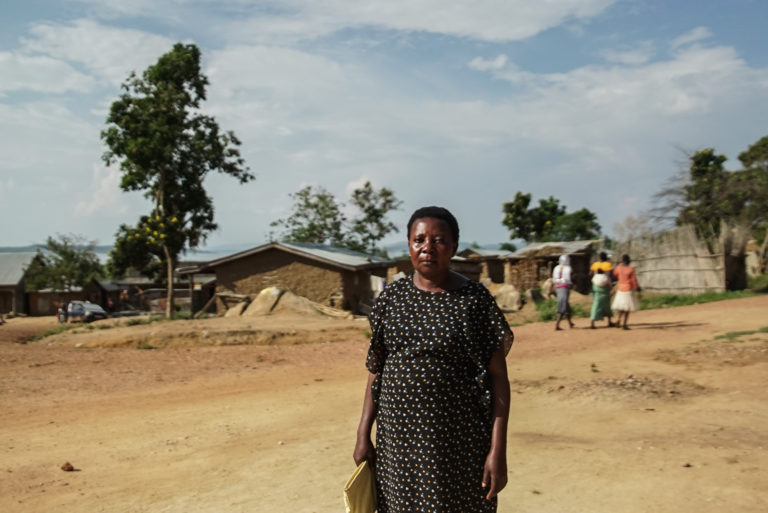
Mariam Nakatu, who is leading a legal case against the government brought by more than 600 evicted residents of Buvuma. Photo: Thomas Lewton for Mongabay.
“When BIDCO came in they didn’t teach people about the positives and negatives,” says Mariam Nakatu, who is leading a legal case against the government brought by more than 600 evicted residents of Buvuma. Photo: Thomas Lewton for Mongabay.
By bringing women to the fore during land negotiations, the eco-feminist movement hopes to slow the sale of land for extractive industries. Women, Namanya says, have a deeper understanding of the value of land and the natural services it provides to families, and so are less willing to sell in the first place. “Our husbands sell the land that we are farming on without us knowing, and when they receive the money they run off and marry other wives,” says Benine Naluyima, of the Ganyana Women’s Group, a cooperative making charcoal-saving stoves and replanting trees on the island.
Seeking out alternative, sustainable livelihoods on Buvuma, the Bukigindi Tree Planting Women’s Group has also replanted 18 hectares (45 acres) of degraded land, which was once protected rainforest, with indigenous species such as mahogany and musizi. Nansimbe leads the group up a hillside, pointing out the crops the community is growing in the protective shade of young trees. Gradually, as the forest thickens, they will have a renewed source of firewood and other forest products.
Yet the process of regeneration is slow, and their work is becoming more challenging as the climate changes. “The sun is shining too much during the dry season now, and it’s difficult to get water to the trees from the lake,” Nansimbe says.
Considering the strength of the palm oil industry, and the government’s support of it, others are willing to compromise. Betty Kabwaalu Nanyonjo, who grew up on the Ssesse Islands, regularly visits Buvuma, sharing her experiences and advising women not to sell their land. “People from outside coming to buy your land. Is that development?” she asks. Yet Nanyonjo encourages women to “get involved” in growing oil palm. “Let the people grow the oil palm and the investors buy the oil,” she says. “You welcome the project, because whether you like it or not the project will take off.”
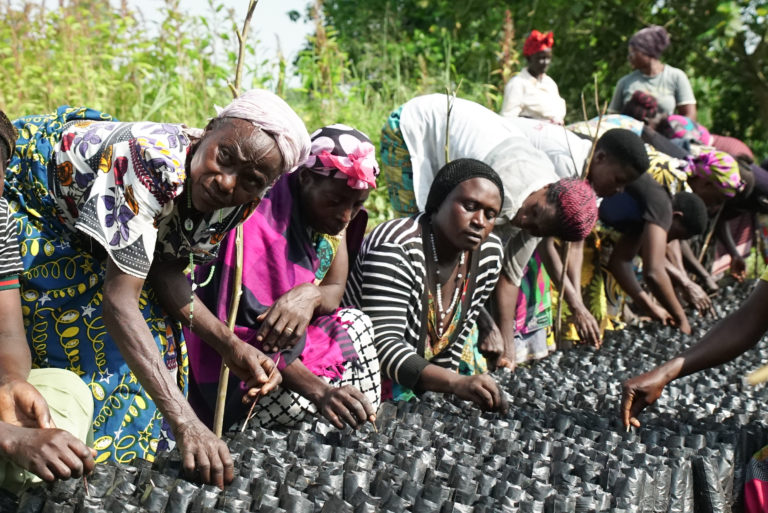
The Bukigindi Tree Planting Women’s Group has replanted 18 hectares (45 acres) of degraded land near Bugoma with indigenous species. Photo: Thomas Lewton for Mongabay



